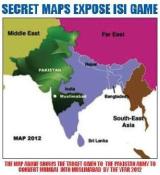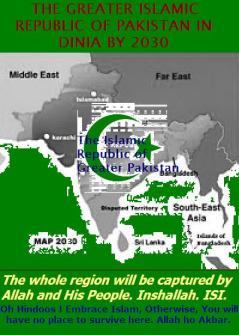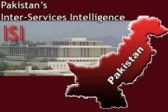Pakistan proposed making India as Greater Islamic Republic of Pakistan by 2030.
 Hindu Existence News Bureau , New Delhi || 30 December, 2011- Pakistan secret agency, Inter Service Intelligence (ISI) has revised its planning to reconvert India as an Islamic Country by joining it with Pakistan under a GREATER ISLAMIC REPUBLIC OF PAKISTAN within 2030. Earlier they have fixed this target within 2020. This one can be somewhat funny to the reluctant and ignorant people of India under a political influence of absurd Indo-Pak friendship. But, Pakistan apparently has come with some new plans to destabilize India by influencing some developments in the north, west and southern parts of the country, as part of its multi-pronged strategy. Terrorists who were caught by Indian Security Force in Kashmir revealed this information. ISI (Pakistan’s intelligence agency) is the main culprit behind.
Hindu Existence News Bureau , New Delhi || 30 December, 2011- Pakistan secret agency, Inter Service Intelligence (ISI) has revised its planning to reconvert India as an Islamic Country by joining it with Pakistan under a GREATER ISLAMIC REPUBLIC OF PAKISTAN within 2030. Earlier they have fixed this target within 2020. This one can be somewhat funny to the reluctant and ignorant people of India under a political influence of absurd Indo-Pak friendship. But, Pakistan apparently has come with some new plans to destabilize India by influencing some developments in the north, west and southern parts of the country, as part of its multi-pronged strategy. Terrorists who were caught by Indian Security Force in Kashmir revealed this information. ISI (Pakistan’s intelligence agency) is the main culprit behind.
 An article in the Power Politics magazine says that the ISI has passed two maps to the Pakistan Army to increase the moral of the troops by giving them a target to break and merge India in Pakistan forming Islamic Republic of Pakistan by2020. This will somehow increase the confidence of the public of Pakistan also who always dream of troubled India.
An article in the Power Politics magazine says that the ISI has passed two maps to the Pakistan Army to increase the moral of the troops by giving them a target to break and merge India in Pakistan forming Islamic Republic of Pakistan by2020. This will somehow increase the confidence of the public of Pakistan also who always dream of troubled India.
The terrorists are using alternative routes to India. From Pakistan they go to Dubai, Bangkok, Nepal and Bangladesh to enter India. The write up further says that ISI has been attempting to cover India both from sea and land routes just like the Chinese strings of pearl theory. ISI is already pushing fake Indian currency in to the Indian market thus creating a hole in the Indian economy.
Pakistan is time to time searching for chances and making excuses in front of the world to bring its force back to the Indian borders, currently under the pressure from U.S, they are fighting with insurgency near Afghanistan-Pakistan border.
………………………………………………………………………………………..
 In a recent publication in Daily Express in Urdu from Pakistan the conspiracy of ISI was published as a summary report. The ISI of Pakistan Government has its heinous Plan to capture India by (1) Explosion of Muslim Population in India and Mass conversion of Hindus in Islamic faith, (2) Infiltration of Jihadi and Muslim populace into India from neighboring countries, (3) Spreading terror over the Indian Hindu population by Jihadi attacks, (4) Oppression over Minority Hindu people and Capturing Hindu girls and women in Muslim majority areas, (5) Destabilize Indian economy through fake currency and parallel Islamic Banking, (6) Putting ISI agents in Indian Strategic authorities, Defense system and General administration, (7) Establishing 10 lac New Mosques and Madarshas in Non Muslim areas to signify the Islamic influence in India, (8) Capturing Indian print, electronic and entertainment media at any cost, (9) Capturing all the Indian Political parties to have a absolute Islamic power in Indian Parliament and (10) To hoist Islamic flag atop Lal Quila, President’s House, Indian Parliament and Supreme Court after getting a total control over India by Pakistan.With the points surfaced above the concerned India expert say that the General Election in India 2014 may be fatal to Hindus if they do not vote for a Hindu supremacy in India. Otherwise the ISI operators in various political parties will surely take such steps by which the Hindus will be debarred from their rights to enjoy their Hindu identity in their ancestral land.…………………………………………………………………………………..
In a recent publication in Daily Express in Urdu from Pakistan the conspiracy of ISI was published as a summary report. The ISI of Pakistan Government has its heinous Plan to capture India by (1) Explosion of Muslim Population in India and Mass conversion of Hindus in Islamic faith, (2) Infiltration of Jihadi and Muslim populace into India from neighboring countries, (3) Spreading terror over the Indian Hindu population by Jihadi attacks, (4) Oppression over Minority Hindu people and Capturing Hindu girls and women in Muslim majority areas, (5) Destabilize Indian economy through fake currency and parallel Islamic Banking, (6) Putting ISI agents in Indian Strategic authorities, Defense system and General administration, (7) Establishing 10 lac New Mosques and Madarshas in Non Muslim areas to signify the Islamic influence in India, (8) Capturing Indian print, electronic and entertainment media at any cost, (9) Capturing all the Indian Political parties to have a absolute Islamic power in Indian Parliament and (10) To hoist Islamic flag atop Lal Quila, President’s House, Indian Parliament and Supreme Court after getting a total control over India by Pakistan.With the points surfaced above the concerned India expert say that the General Election in India 2014 may be fatal to Hindus if they do not vote for a Hindu supremacy in India. Otherwise the ISI operators in various political parties will surely take such steps by which the Hindus will be debarred from their rights to enjoy their Hindu identity in their ancestral land.…………………………………………………………………………………..
 The case of destabilizing Hindustan by Pakistan has been taken by Indian Foreign Department seriously as reports came in. Earlier a plan of Mughlistan was surfaced to capture India by the conspiracy by the Bangladeshi secret agency DGFI.
The case of destabilizing Hindustan by Pakistan has been taken by Indian Foreign Department seriously as reports came in. Earlier a plan of Mughlistan was surfaced to capture India by the conspiracy by the Bangladeshi secret agency DGFI.
 Hindu Existence News Bureau , New Delhi || 30 December, 2011- Pakistan secret agency, Inter Service Intelligence (ISI) has revised its planning to reconvert India as an Islamic Country by joining it with Pakistan under a GREATER ISLAMIC REPUBLIC OF PAKISTAN within 2030. Earlier they have fixed this target within 2020. This one can be somewhat funny to the reluctant and ignorant people of India under a political influence of absurd Indo-Pak friendship. But, Pakistan apparently has come with some new plans to destabilize India by influencing some developments in the north, west and southern parts of the country, as part of its multi-pronged strategy. Terrorists who were caught by Indian Security Force in Kashmir revealed this information. ISI (Pakistan’s intelligence agency) is the main culprit behind.
Hindu Existence News Bureau , New Delhi || 30 December, 2011- Pakistan secret agency, Inter Service Intelligence (ISI) has revised its planning to reconvert India as an Islamic Country by joining it with Pakistan under a GREATER ISLAMIC REPUBLIC OF PAKISTAN within 2030. Earlier they have fixed this target within 2020. This one can be somewhat funny to the reluctant and ignorant people of India under a political influence of absurd Indo-Pak friendship. But, Pakistan apparently has come with some new plans to destabilize India by influencing some developments in the north, west and southern parts of the country, as part of its multi-pronged strategy. Terrorists who were caught by Indian Security Force in Kashmir revealed this information. ISI (Pakistan’s intelligence agency) is the main culprit behind.
The map targets North India, and shows the region as a shadow of ‘Islamic Republic of Pakistan’ by 2020. It also projects South India as disputed territory and treats the Indian neighbors China (China has the responsibility of doing everything for Pakistan), Nepal, Bhutan, Bangladesh, Myanmar, and Sri Lanka as their neighbouring countries. They also considered Andaman and Nicobar Islands of India as Islands of Bangladesh The map also indicates their desire of changing Mumbai’s topography, turning the South Asia’s economic capital Mumbai (Bombay) into ‘Muslimabad’ by 2012.
……………………………………………………………………………..
 An article in the Power Politics magazine says that the ISI has passed two maps to the Pakistan Army to increase the moral of the troops by giving them a target to break and merge India in Pakistan forming Islamic Republic of Pakistan by2020. This will somehow increase the confidence of the public of Pakistan also who always dream of troubled India.
An article in the Power Politics magazine says that the ISI has passed two maps to the Pakistan Army to increase the moral of the troops by giving them a target to break and merge India in Pakistan forming Islamic Republic of Pakistan by2020. This will somehow increase the confidence of the public of Pakistan also who always dream of troubled India.The terrorists are using alternative routes to India. From Pakistan they go to Dubai, Bangkok, Nepal and Bangladesh to enter India. The write up further says that ISI has been attempting to cover India both from sea and land routes just like the Chinese strings of pearl theory. ISI is already pushing fake Indian currency in to the Indian market thus creating a hole in the Indian economy.
Pakistan is time to time searching for chances and making excuses in front of the world to bring its force back to the Indian borders, currently under the pressure from U.S, they are fighting with insurgency near Afghanistan-Pakistan border.
………………………………………………………………………………………..
 In a recent publication in Daily Express in Urdu from Pakistan the conspiracy of ISI was published as a summary report. The ISI of Pakistan Government has its heinous Plan to capture India by (1) Explosion of Muslim Population in India and Mass conversion of Hindus in Islamic faith, (2) Infiltration of Jihadi and Muslim populace into India from neighboring countries, (3) Spreading terror over the Indian Hindu population by Jihadi attacks, (4) Oppression over Minority Hindu people and Capturing Hindu girls and women in Muslim majority areas, (5) Destabilize Indian economy through fake currency and parallel Islamic Banking, (6) Putting ISI agents in Indian Strategic authorities, Defense system and General administration, (7) Establishing 10 lac New Mosques and Madarshas in Non Muslim areas to signify the Islamic influence in India, (8) Capturing Indian print, electronic and entertainment media at any cost, (9) Capturing all the Indian Political parties to have a absolute Islamic power in Indian Parliament and (10) To hoist Islamic flag atop Lal Quila, President’s House, Indian Parliament and Supreme Court after getting a total control over India by Pakistan.With the points surfaced above the concerned India expert say that the General Election in India 2014 may be fatal to Hindus if they do not vote for a Hindu supremacy in India. Otherwise the ISI operators in various political parties will surely take such steps by which the Hindus will be debarred from their rights to enjoy their Hindu identity in their ancestral land.…………………………………………………………………………………..
In a recent publication in Daily Express in Urdu from Pakistan the conspiracy of ISI was published as a summary report. The ISI of Pakistan Government has its heinous Plan to capture India by (1) Explosion of Muslim Population in India and Mass conversion of Hindus in Islamic faith, (2) Infiltration of Jihadi and Muslim populace into India from neighboring countries, (3) Spreading terror over the Indian Hindu population by Jihadi attacks, (4) Oppression over Minority Hindu people and Capturing Hindu girls and women in Muslim majority areas, (5) Destabilize Indian economy through fake currency and parallel Islamic Banking, (6) Putting ISI agents in Indian Strategic authorities, Defense system and General administration, (7) Establishing 10 lac New Mosques and Madarshas in Non Muslim areas to signify the Islamic influence in India, (8) Capturing Indian print, electronic and entertainment media at any cost, (9) Capturing all the Indian Political parties to have a absolute Islamic power in Indian Parliament and (10) To hoist Islamic flag atop Lal Quila, President’s House, Indian Parliament and Supreme Court after getting a total control over India by Pakistan.With the points surfaced above the concerned India expert say that the General Election in India 2014 may be fatal to Hindus if they do not vote for a Hindu supremacy in India. Otherwise the ISI operators in various political parties will surely take such steps by which the Hindus will be debarred from their rights to enjoy their Hindu identity in their ancestral land.…………………………………………………………………………………..
In the published map of India in three phases ISI planned to capture entire Jammu and Kashmir, part of Punjab and Haryana within 2012. In the next phase Gujarat, Maharashtra, Rajasthan have been included in the Greater Pakistan within 2020 and finally the entire India is to included in the Greater Islamic Republic of Pakistan by 2030.
…………………………………………………………………………………. The case of destabilizing Hindustan by Pakistan has been taken by Indian Foreign Department seriously as reports came in. Earlier a plan of Mughlistan was surfaced to capture India by the conspiracy by the Bangladeshi secret agency DGFI.
The case of destabilizing Hindustan by Pakistan has been taken by Indian Foreign Department seriously as reports came in. Earlier a plan of Mughlistan was surfaced to capture India by the conspiracy by the Bangladeshi secret agency DGFI.
…………………………………………………………………………………….
PAKISTANI PROVOCATION TO CONVERT INDIA TO PAKISTAN THROUGH YOUTUBE.





 The
most recent complaint, he said, was the demolition of Sri Muneswarer
temple by Kuala Lumpur City Hall (DBKL) “in collaboration” with its
private landowner at Segambut Aman, Kuala Lumpur, “on or about” Dec 27.
The
most recent complaint, he said, was the demolition of Sri Muneswarer
temple by Kuala Lumpur City Hall (DBKL) “in collaboration” with its
private landowner at Segambut Aman, Kuala Lumpur, “on or about” Dec 27. Hindraf
is demanding that the land on which the temple was previously sited be
acquired and two acres of the land be granted for the temple to be
permanently located.
Hindraf
is demanding that the land on which the temple was previously sited be
acquired and two acres of the land be granted for the temple to be
permanently located. KUALA LUMPUR, Dec 30 — Indelible ink alone does not guarantee fair elections, Datuk Seri Anwar Ibrahim echoed today, urging the Parliament Select Committee (PSC) to consider all of Bersih’s reform demands.
KUALA LUMPUR, Dec 30 — Indelible ink alone does not guarantee fair elections, Datuk Seri Anwar Ibrahim echoed today, urging the Parliament Select Committee (PSC) to consider all of Bersih’s reform demands.











